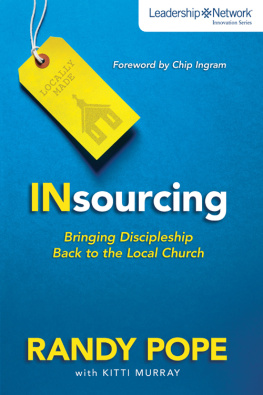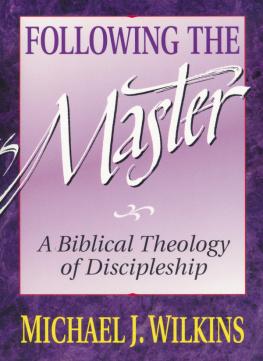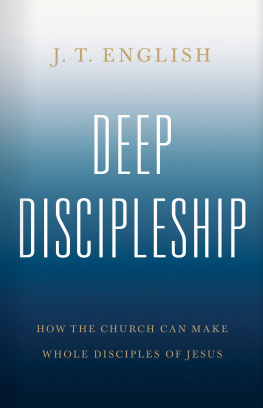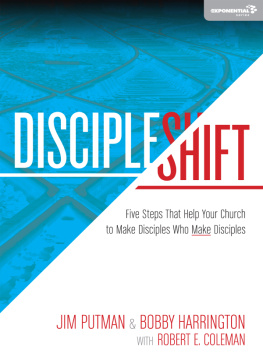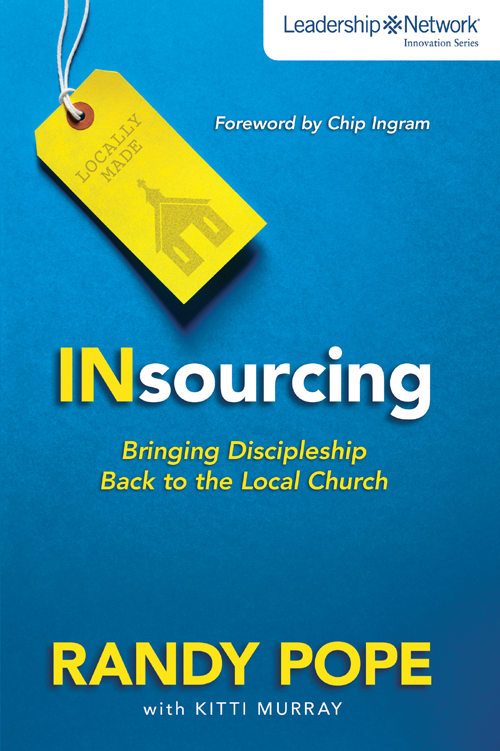Luke, Ryanne, Wyatt, and those yet to come.
be a part of your heritage and your lifestyle.
I t is a great honor and privilege to highly recommend this book to you.
I recommend it not because I know Randy Pope personally and have watched up close (in my seven years in Atlanta) the reality and impact of what you are about to read.
I dont even recommend it because its a practical, helpful, and proven method for producing mature, godly followers of Jesus Christ.
Although those reasons would be more than enough to recommend it, I am compelled to offer the following three reasons you should read, digest, and practice what Randy shares:
1. Christianity is in crisis. Most Christians simply do not live like Christians.
2. Jesus said, Make disciples. Even our most successful churches and programs are not producing mature, godly, high-integrity followers of Christ who, in turn, lead others to Christ and make disciples.
3. Life-on-life missional discipleship is what is missing. And this book does not simply teach and inspire; it draws on biblical truth and a decades-long proven track record, and it shows you how.
Every pastor, church leader, small group leader, and parent will have no argument with the case Randy makes, but few are actually doing whats described in these pages.
There are no shortcuts. Discipling your children, your small group, or your flock requires clear priorities, a specific plan, and large doses of time and energy in the trenches with those youre called to equip to become mature followers of Jesus.
The good news: this book will do more than get you started. Ive devoted the better half of my life and energy to helping Christians live like Christians, and this book is a practical and grace-filled guide to that end.
Thank you, Randy, for doing it rather than telling us what ought to be done. This volume is a treasure to Christs church and for all who long to present a bride unblemished and pure to our Savior.
Chip Ingram, President and Teaching Pastor,
Living on the Edge; author, True Spirituality:
Becoming a Romans 12 Christian
I t was a time of evaluation. Of my life. Of my family. Of the church I pastor. Anything and everything was up for grabs. With a pad of paper in my lap and a pencil in hand, I stared at a wall and asked myself questions: How healthy is our church? How well are we progressing? How faithful are our people?
All appeared to be going well. We were far from a shallow church. We were uncompromising on moral issues, we were growing rapidly, and there were frequent conversions. The work of Christ and the centrality of the gospel were primary. There seemed to be unity and harmony among our people. Articles were being written about us. A prominent author included Perimeter in his book about innovative churches. I should have been more than encouraged. But I wasnt. Something was missing, and I couldnt put my finger on it.
I stabbed a single dot on my pad of paper. I imagined the paper was the wall in front of me and my pen was an arrow shot aimlessly at it. I drew a circle around the dot, turning it into a perfect shot on the bulls-eye. I laughed to myself, thinking how foolish it would be to celebrate when your target is determined by your shot.
Then I realized I had identified the source of my unease.
We were being celebrated and applauded, held up as an example of innovation, but for all the wrong reasons. The accolades wed received were not because wed hit an appropriate target but because the distance wed shot impressed people.
It dawned on me that we had failed as a church to identify our target.
I knew what our target should not be. Not our reputation, an ever-increasing budget, or even gospel-centered preaching or a high number of conversions. None of these are worthy targets in and of themselves. They might accrue to us if we hit the right target, but they should never be the target itself.
After a few moments, I had a clearer picture of the target we should have been aiming at all along. It wasnt a number, a building, a congregation, an ideal, or anything like what we had achieved to that point. The target was really the life of a single person. Our goal, as a church, was really to mobilize each individual for the benefit of the kingdom, to see people become engaged in Gods story, a story that stretches into eternity. The church is made up of persons, one unique person after another, each of whose name is known in heaven and whose hairs are numbered by the God of that heaven.
I wasnt forgetting the glory of God as our chief end, I assure you. But we should not forget that its the people of the church who glorify God and enjoy him forever, not the programs or structures or events. The target of our efforts as a church must be the people, each and every one of them. But what does that mean, practically? What does it mean to take aim at the individuals in our care? If our goal is to connect lives with the glory of God, what would a life look like if we achieved that goal?
My first answer to this question was pretty straightforward: we should develop into people who grow in their commitment to Jesus and in their knowledge of the Word. Sounds good, right? But that isnt good enough. After more time and thought, two words emerged: mature and equipped. One can grow in commitment to Jesus and in knowledge of the Word without being mature or equipped, but the inverse cannot be true. I knew that if we set our sights on the spiritual formation of our people, making their maturity and equipping our ultimate goal, we would cover all the bases. And that is the target that has shaped our ministry since that day.
Ive since become focused on the words mature and equipped. Though there are no clear definitions of these words in Scripture, I decided to take my best shot at biblically describing what a mature, equipped persons life should look like. My description certainly is not perfect, but it was close enough to create a biblical target.
A mature and equipped believer is someone who
1. is living consistently under the control of the Holy Spirit, the direction of the Word of God, and the compelling love of Christ;
2. has discovered, developed, and is using their spiritual gifts;
3. has learned to effectively share their faith, while demonstrating a radical love that amazes those it touches;
4. gives evidence of being
a faithful member of Gods church,
an effective manager of life, relationships, and resources,
a willing minister to others, including the least of these, and
an available messenger to nonkingdom people; and
5. demonstrates a life characterized as
gospel driven,
worship focused,
morally pure,
evangelistically bold,
discipleship grounded,
family faithful, and

